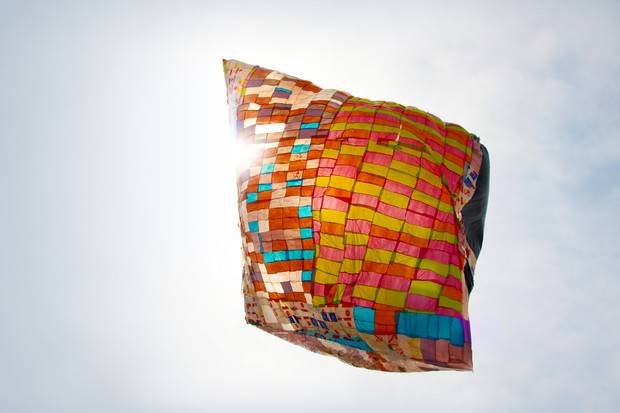Borges’ "The Library of Babel" is Now a Digital Reality
It is hard to believe that it did not exist until now, but it is also difficult to conceive that somebody has created it: this is the hexagonal and dizzying labyrinthine Babel in a website.
All who have read Borges in the 20th century will have wondered what the writer would have said about the probable infinity of Internet. On hyperlinks, in particular, that function like footnotes and can send us to everything that has been written, is being written and will be written (and even digitalized) in the future. New York writer Jonathan Basile, a die-hard Borgesian, not only asked himself this, but is building an authentic digital Library of Babel.
Basile had to learn programming from scratch to create Borges’ Universal Library as a webpage. Until now the results are at the very least overwhelming; labyrinthine, interminable and sometimes metaphysical like the Borges story, and which in more than one sense could be a horror story. The programmer took as a structural guide the first paragraph of “The Library of Babel” that describes a vast architecture of interconnected hexagons, each one with four walls of shelves and passageways that lead to other identical hexagons.
When it is completed, the digital library will contain a possible combination of 1,312,000 characters, included the 24 letters of the alphabet, periods, commas and spaces. It will thus house every book that has ever been written and every book that could ever be written. It currently contains 1,024,640 volumes of apparent nonsense and which are sufficient to generate (data)vertigo in anybody.
But the relevant, the meaningful, would be to extract from the immense swarm of possible literatures something lasting, necessary, as the librarians of Borges’ story do, and who are condemned to review volumes to find sequences of meaning. Of all the finite combinations of 24 letters, periods, commas and spaces, finding something that provides significance; that is, one or a series of coherent words. And this is perhaps the best part of the digital version (perhaps enviable for the librarians of the story): Control-Find.
Needless to say, Basile’s ambition is an epic task, but somebody had to do it. It is important to mention that, given that it is an interactive and mobile website, it is no longer that “solitary, perfectly immobile and secret” library that Borges imagined. Furthermore, the fact that this digital library employs engineers, in this case Basile, but not a librarian, it leaves out one of the most beautiful aspects of the printed world: books are made by people and as a result each one possesses a marked individualism: by being generated randomly by a computer they lose that extravagance of none being like another (even two copies that are presumably identical).
But it also should be pointed out that the project is faithful to the alchemy of labyrinths, mirrors and texts belonging to the Borgesian universe. And it is a beautiful extension. We could also think ––and why not?–– that this cybernetic experiment is one of the possible universes within the “The Library of Babel,” one of the books that somebody imagined in the form of a complete library, hyperlinked and digital.
The project, more than can be explained here, is illuminated as one browses through it, but if you don’t know where to begin:
Search for your name (or favorite word) in one of the texts within one of the library’s hexagons: http://libraryofbabel.info/textsearch.html
Find a hexagon with your initials or lucky number: http://libraryofbabel.info/browse.cgi
Enjoy getting lost.
Related Articles
When ancient rituals became religion
The emergence of religions irreversibly changed the history of humanity. It’s therefore essential to ask when and how did ancient peoples’ rituals become organized systems of thought, each with their
Seven ancient maps of the Americas
A map is not the territory. —Alfred Korzybski Maps are never merely maps. They’re human projections, metaphors in which we find both the geographical and the imaginary. The cases of ghost islands
An artist crochets a perfect skeleton and internal organs
Shanell Papp is a skilled textile and crochet artist. She spent four long months crocheting a life-size skeleton in wool. She then filled it in with the organs of the human body in an act as patient
A musical tribute to maps
A sequence of sounds, rhythms, melodies and silences: music is a most primitive art, the most essential, and the most powerful of all languages. Its capacity is not limited to the (hardly trivial)
The enchantment of 17th-century optics
The sense of sight is perhaps one the imagination’s most prolific masters. That is why humankind has been fascinated and bewitched by optics and their possibilities for centuries. Like the heart, the
Would you found your own micro-nation? These eccentric examples show how easy it can be
Founding a country is, in some ways, a simple task. It is enough to manifest its existence and the motives for creating a new political entity. At least that is what has been demonstrated by the
Wondrous crossings: the galaxy caves of New Zealand
Often, the most extraordinary phenomena are “jealous of themselves” ––and they happen where the human eye cannot enjoy them. However, they can be discovered, and when we do find them we experience a
Think you have strange reading habits? Wait until you've seen how Mcluhan reads
We often forget or neglect to think about the infinite circumstances that are condensed in the acts that we consider habitual. Using a fork to eat, for example, or walking down the street and being
The sky is calling us, a love letter to the cosmos (video)
We once dreamt of open sails and Open seas We once dreamt of new frontiers and New lands Are we still a brave people? We must not forget that the very stars we see nowadays are the same stars and
The sister you always wanted (but made into a crystal chandelier)
Lucas Maassen always wanted to have a sister. And after 36 years he finally procured one, except, as strange as it may sound, in the shape of a chandelier. Maassen, a Dutch designer, asked the










